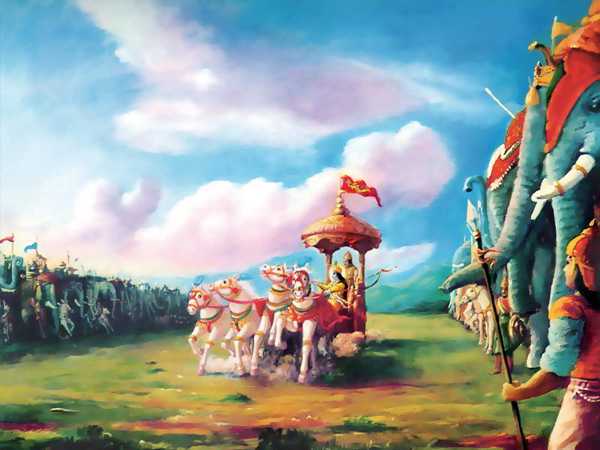Chapter 149

“Vasudeva said, ‘After Gandhari had said this, that ruler of men,Dhritarashtra, then said these words to Duryodhana in the midst of the(assembled) monarchs, ‘O Duryodhana, listen, O son, to what I say, andblessed be thou; do that if thou hast any respect for thy father. Thelord of creatures, Soma, was the original progenitor of the Kuru race.Sixth in descent from Soma, was Yayati, the son of Nahusha. Yayati hadfive best of royal sages as his sons. Amongst them, lord Yadu of mightyenergy was the eldest-born. Younger to Yadu was Puru, who, as ourprogenitor, brought forth by Sarmistha the daughter of Vrishaparvan.Yadu, O best of the Bharatas, was born of Devayani and, therefore, Osire, was the daughter’s son of Sukra, otherwise called Kavya, ofimmeasurable energy. Endued with great strength and prowess, thatprogenitor of the Yadavas, filled with pride and possessed of wickedunderstanding, humiliated all the Kshatriyas. Intoxicated with pride ofstrength, he obeyed not the injunctions of his father. Invincible inbattle, he insulted his father and brother. On this earth girt on foursides by the sea, Yadu became all-powerful, and reducing all tosubjection, he established himself in this city called after theelephant. His father Yayati, the son of Nahusha, enraged with him, cursedthat son of his, and, O son of Gandhari, even expelled him from thekingdom. Angry Yayati also cursed those brothers of Yadu who wereobedient to that eldest brother of theirs, who was so proud of hisstrength. And having cursed his these sons, that best of kings placed onhis throne his youngest son Puru who was docile and obedient to him. Thuseven the eldest son may be passed over and deprived of the kingdom, andyounger sons may, in consequence of their respectful behaviour to theaged, obtain the kingdom. So also, conversant with every virtue there wasmy father’s grandfather, king Pratipa, who was celebrated over the threeworlds. Unto that lion among kings, who ruled his kingdom virtuously wereborn three sons of great fame and resembling three gods. Of them, Devapiwas the eldest, Vahlika the next and Santanu of great intelligence, who,O sire, was my grandfather, was the youngest. Devapi, endued with greatenergy, was virtuous, truthful in speech, and ever engaged in waitingupon his father. But that best of kings had a skin-disease. Popular withboth the citizens and the subjects of the provinces, respected by thegood, and dearly loved by the young and the old, Devapi was liberalfirmly adhering to truth, engaged in the good of all creatures, andobedient to the instructions of his father as also of the Brahmanas. Hewas dearly loved by his brother Vahlika as also the high-souled Santanu.Great, indeed, was the brotherly love that prevailed between him and hishigh-souled brothers. In course of time, the old and best of kings,Pratipa, caused all preparations to be made according to the scripturesfor the installation of Devapi (on the throne). Indeed, the lord Pratipacaused every auspicious preparation. The installation of Devapi, however,was forbidden by the Brahmanas and all aged persons amongst the citizensand the inhabitants of the provinces. Hearing that the installation ofhis son was forbidden, the voice of the old king became choked with tearsand he began to grieve for his son. Thus, though Devapi was liberal,virtuous, devoted to truth, and loved by the subjects, yet in consequenceof his skin-disease, he was excluded from his inheritance. The gods donot approve of a king that is defective of a limb. Thinking of this,those bulls among Brahmanas forbade king Pratipa to install his eldestson. Devapi then, who was defective of one limb, beholding the king (hisfather) prevented (from installing him on the throne) and filled withsorrow on his account, retired into the woods. As regards Vahlika,abandoning his (paternal) kingdom he dwelt with his maternal uncle.Abandoning his father and brother, he obtained the highly wealthy kingdomof his maternal grandfather. With Vahlika’s permission, O prince, Santanuof world-wide fame, on the death of his father (Pratipa), became king andruled the kingdom. In this way also, O Bharata, though I am the eldest,yet being defective of a limb, I was excluded from the kingdom byintelligent Pandu, no doubt, after much reflection. And Pandu himself,though younger to me in age, obtained the kingdom and became king. At hisdeath, O chastiser of foes, that kingdom must pass to his sons. When Icould not obtain the kingdom, how canst thou covet it? Thou art not theson of a king, and, therefore, hast no right to this kingdom. Thou,however, desirest to appropriate the property of others. High-souledYudhishthira is the son of a king. This kingdom is lawfully his. Ofmagnanimous soul, even he is the ruler and lord of this race of Kuru. Heis devoted to truth, of clear perception, obedient to the counsels offriends, honest, loved by the subjects, kind to all well-wishers, masterof his passions, and the chastiser of all that are not good. Forgiveness,renunciation, self-control, knowledge of the scriptures, mercy to allcreatures, competence to rule according to the dictates of virtue, of allthese attributes of royalty exist in Yudhishthira. Thou art not the sonof a king, and art always sinfully inclined towards thy relatives. Owretch, how canst thou succeed in appropriating this kingdom thatlawfully belongeth to others? Dispelling this delusion, give half thekingdom with (a share of the) animals and other possessions. Then, Oking, mayest thou hope to live for some time with thy younger brothers.'”




